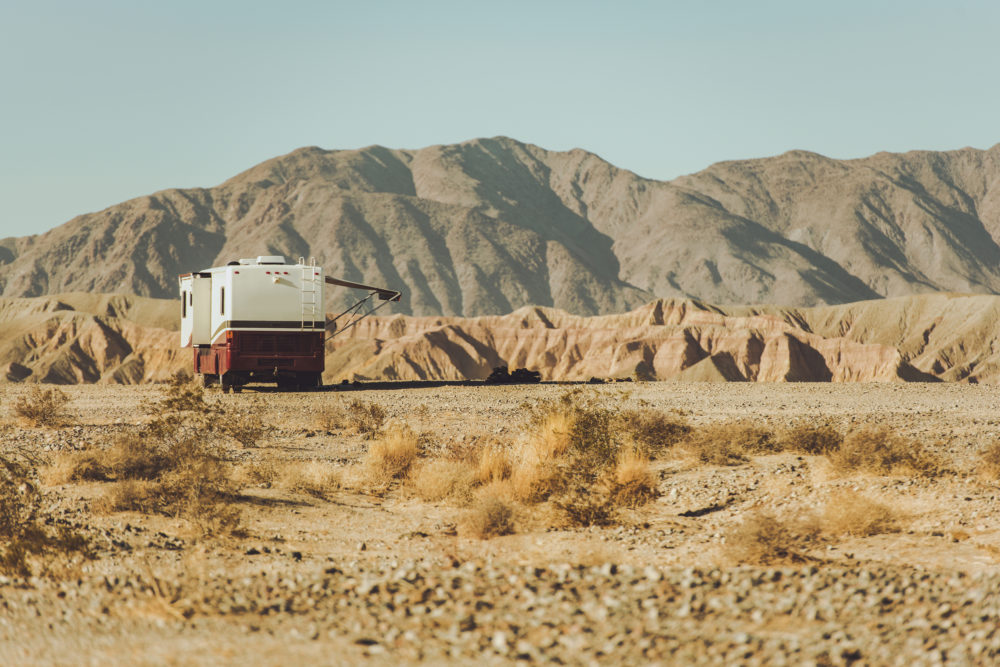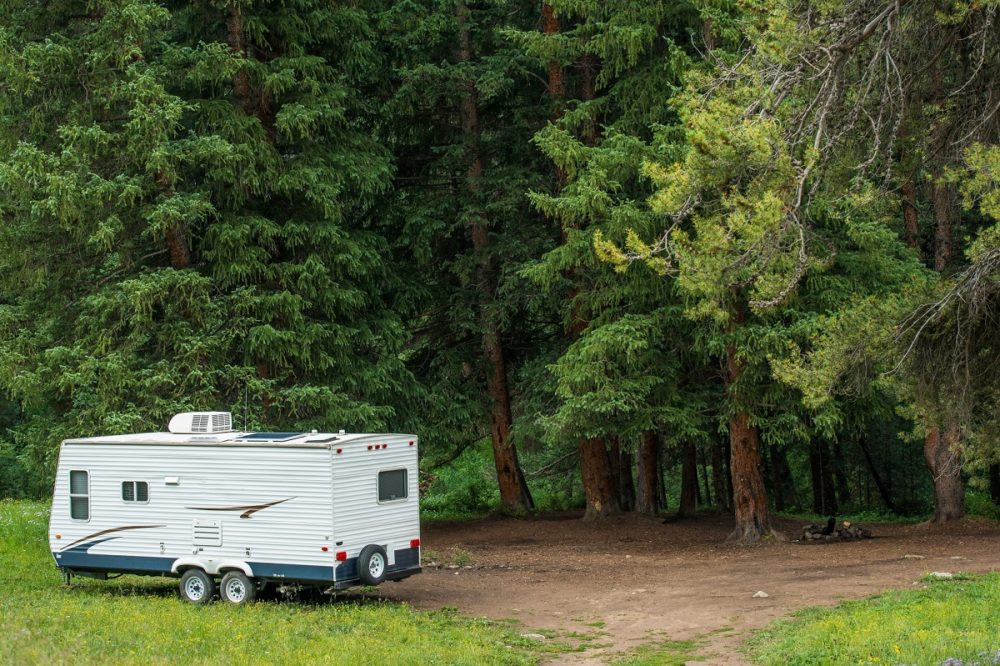What Is Boondock Camping?
Boondocking is referred to when you use your RV for a stay without any water, electric or sewer hookup. Your RV is fully self-contained.
Those who tent-camp usually tent without any access to water, electric or septic, as well, although some RV parks or State Parks have designated tent sites with a water spigot and an electric outlet to use, as well as shower and bathroom amenities.

Contents
Boondocking can be done on the side of the road, in a driveway, on someone’s land or in the woods. There are terms that sub-define each of these.
Where Can You Find Free Boondocking Sites?
There are several store or restaurant chains that allow you to boondock in their parking lot for one night. They request you to let them know and ideally, you want to give them some business in return. Walmart, Sam’s Club, Costco, Home Depot, Cabela’s, Camping World, Cracker Barrel, Anytime Fitness, 24 Hour Fitness all allow one-night overnight stay at your own risk.
You can also use their bathroom and sink during hours of operations.
There are also Websites or apps that have a database of places where one can boondock:
- CAMPENDIUM
- The Dyrt
- Harvest Hosts
- net
- iOverlander
- Ultimate Campgrounds
- Boondockers Welcome
- The Frugal Shunpiker’s Guide
- Google Maps
- Websites/Instagram.
Of course, the best spots are referred to by networking and word-of-mouth via RV friends or people you meet at RV parks.
Is Boondocking Legal?
Boondocking is totally legal. Boondocking is also called dispersed camping. The BLM and National Forest jurisdictions allow dispersed camping in areas where it doesn’t conflict with other authorized uses (like hunting) or interfere with natural resources or wildlife.
Some states are more boondocking-friendly than others, simply by the amount of land they offer for boondocking opportunities. Some of the more boondocking-friendly states include:
- Utah
- Arizona
- California
- Oregon, and
- Montana.
If you decide to boondock on illegal places (aka private land or prohibited areas), you are trespassing AT MINIMUM. Some states have a minimum fine of $275 plus getting towed. In some states (i.e. some areas in the South), trespassing on posted property might be more serious than just a fine, as people do not look upon trespassing there lightly.
Free dispersed camping is allowed anywhere in National Forests, unless noted otherwise. There are, however, access limitations and length limits on RVs (often, it’s 35-40 ft). Some areas have access roads, while other sites might be more remote and inaccessible by RV.
5 Types Of Boondocking
There are five different ways to boondock and they each have a specific nickname:
Wild Camping
Wiki Voyage defines wild camping as “camping outside of campsites, such as often when wilderness backpacking, but also as an option e.g. when driving through sparsely populated areas, going down a river, sea kayaking or cruising on small craft too small to provide berths.” (Source: https://en.wikivoyage.org/wiki/Wild_camping#:~:text=Wild%20camping%20is%20camping%20outside,too%20small%20to%20provide%20berths.)
Moochdocking
Moochdocking means you are boondocking or camping for free on your friends’ or family’s property, most often their driveway. Of course, this is a mutual arrangement and ideally, you don’t want to overstay your welcome to strain your friendship or relationship with relatives.
Lot-Docking
Usually reserved for overnight stay when passing through, lot docking is an overnight stop in a parking lot of a commercial business. A number of national businesses allow travelers to lot-dock for a night as a courtesy. Casinos are famous for allowing lot-docking for patrons. Others include Walmart, Cabela’s or Cracker Barrel.
Dispersed Camping
As defined by the USDA, “dispersed camping is the term used for camping anywhere in the National Forest OUTSIDE of a designated campground. Dispersed camping means no services; such as trash removal, and little or no facilities; such as tables and fire pits, are provided. Some popular dispersed camping areas may have toilets.” (Source: www.fs.usda.gov)
Dry Camping
Dry camping, also known as boondocking, involves camping in an RV, van or motorhome with no hookups (no electricity or water) outside of a traditional campground. Dry campers set up camp on public lands as well as private places (with the permission of the owner), usually for free. (Source: www.pelican.com).

How Much Does It Cost To Boondock?
Boondocking can be as simple and cheap as you want it to be, or as elaborate and expensive as you can afford it to be.
Since your stay is free of charge and without hookups, at minimum you will need a source of water, electric and possibly sewer dumping.
Water: can be filled up at certain spots free of change of at a nominal fee of $10
Electric: if you use a generator, they are about $600-2,000 (depending on what you want), plus extra gas canisters to refill
Propane: as an alternative to electric, propane often runs the stove, many RV refrigerators, the grill and most tankless water heaters. Make sure you fill up all propane tanks, have some spare ones, and budget for refills, if necessary. The cost is anywhere from $65+ for a spare full tank and any refills.
Sewer: you will have to purchase a portable tank ($150-800, depending on choice and volume). A macerator pump is about $100 to make the job easier.
If you want to go “all out”, you can get solar panels, either portable ones ($200-1,000, depending on setup) or professional install with added battery storage ($2,000-9,000, if done professionally).
In addition to these expenses, you will have your regular RVing items, such as food, firewood, flashlights etc.
Beginner Tips On How To Boondock Safely And Responsibly
There are many great blogs written by fellow RVers who love to share their wisdom and experience with RV beginners to help them have a better boondocking stay. One of them is https://adventureswithtucknae.com/boondocking-for-beginners/.
Some key takeaways are:
- Prepare appropriately for the amount of time you plan to boondock
- Have a plan in place for water, electric and bathroom
- Have a way to make fire
- Bring foods you enjoy and that is easy to make (prepping is your friend)
- Collect your trash and haul it away
- Only boondock at allowed places (and let any stores etc. know if you plan to stay in their parking lot for a night)
- Let you family and friends know where you’re going
- Have a flashlight and extra batteries
- Bring a first-aid kit and know the closest hospital and police station info
- Have a gun and know how to use it (especially if traveling solo).
What Are The Boondocking Essentials?
While Pinterest and Instagram offer a plethora of printable RV packing lists for boondockers, Latchit.org developed a pretty concise and complete list of must-haves for those who desire to go boondocking:
- Generator
- Extra fuel
- Propane
- Portable dump tank and pump
- Full fresh water tank
- Portable water bladder and filter
- LED lights (outdoor and indoor)
- Propane space heater
- Leveling blocks
- 12-volt fans
- Dishwashing basin
- Outdoor camping stove or grill
- Camping chairs and table
- Cell phone signal booster (if needed and desired)
- Flashlight
- Emergency kit
- Bug spray
- Road atlas
- Drinking water
(Source: https://www.latchit.org/post/boondocking-must-haves)
For extended boondocking, make sure you bring external batteries, a composting toilet (if needed) and if you have solar panels, great!
FAQs
What is a Boondock package?
The Boondock package is offered by some teardrop trailer companies and offers features like this:
- 5 Piece ABS Off-Road Kit
- Yakima Roof Rack with Spare
- Pitched Axle
- Matte Black Off-Road Wheels
- Custom, Diamond Plate Tongue Box
- Aluminum Utility Platform
- Cargo Netting Above Windows
- Marmoleum Flooring
- Solid Gray Cushions
- Custom Decals
(Source: littleguytrailers.com.)
Other RV manufacturers offer solar-prep/install, on-board generator and other features that help customers enjoy boondocking longer.
What is the best travel trailer for Boondocking?
Some of the most nimble and easy-to-manage travel trailers for boondocking are Jayco Jay Feather Micro 12SRK (note: this one does not have a toilet, so you will need a compost toilet) or the 35-ft long fifth-wheel Forest River XLR Nitro 28DK5 for less remote locations.
Is Boondocking allowed in Big Bend National Park?
There is no vehicle “boondocking” or “dispersed camping” in Big Bend, but for those who wish to get away from it all, the park offers 64 primitive campsites (no hookups, for tents only)along backcountry roads. These sites are located in the most remote desert areas of the park. Some require hours of challenging driving to reach.
How long will an RV battery last Boondocking?
While this largely depends on the condition of your battery, as well as your overall electricity use, most full 12V batteries will last about 2-3 days with conservative use.
How many days can you Boondock?
Some places place duration limits on boondocking, while some don’t allow it at all. Some parks allow boondocking for up to 14 days, while some long-term places offer boondocking areas for up to seven months. Two things that go against more long-term boondocking opportunities are the negative stigma of “squatting” and littering, as well as people’s desire to capitalize on the use of land.
Can you Boondock in a tent?
Technically, the term “boondocking” refers to staying in an RV without any hookups.
When you do that in a tent, it is called old-fashioned tent-camping. However, make sure you are always mindful of the location and those around you; not every place allows tents due to the increase in homeless squatting and living in tents in big cities, giving tent-camping a negative stigma.
When in nature, make sure you don’t litter: “pack-in pack-out” camp.




